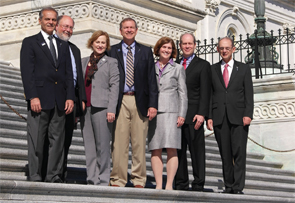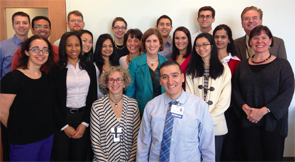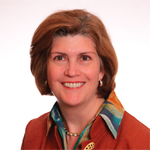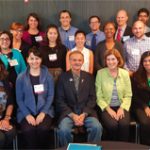
The ACR Executive Committee on Capitol Hill in October 2015.
I am honored, humbled and excited to serve as your ACR president. I’d like to share the following background information to illustrate the diverse set of life experiences I draw from to represent the ACR membership effectively.
Personal Background
Thanks to my mom, who was born and raised in Guatemala, I am bilingual in Spanish and English. I still have more than 50 cousins living in Guatemala. My dad was a Volga German raised in Kansas. I am married to a wonderful man, Blake. We have a blended family of four adult children and three grandchildren, with another one on the way.
As to my career as a physician, I spent two years working at a migrant health clinic in rural Florida and then two more years as an HMO doc and occupational health doc. For most of my career, I have been in academic medicine, which I enjoy immensely. I have had the experience of doing basic science bench research in my early career and have led numerous clinical studies, both investigator initiated and pharma funded. I have always had a busy clinical practice and, most fun for me, I have trained 88 rheumatology fellows, mentored many faculty and taught innumerable residents and medical students.
Witness to Change
Over the past three decades during which I have been a rheumatologist, our entire specialty has changed. For the most part, I believe these changes have improved the quality of life for our patients, rheumatologists and the greater rheumatology community. But we still have continued challenges, among them, insurance companies practicing medicine, governmental changes, funding issues and the workforce shortage.
The ACR has responded to the changing environmental demands of our profession and will continue to do so. Great headway has been made in a number of areas, quality and advocacy among them.

Dr. Von Feldt with fellows and faculty mentees at the University of Pennsylvania.
Where the ACR Is Headed
An ACR resource that continues to expand and attract interest is the RISE Registry. The dream of preceding ACR leadership, the ACR RISE Registry now has successfully connected 45 practices submitting data; 75 practices with signed contracts; 215 providers; 1,273,137 encounters; and 413,605 RA encounters. This seamless (once established) data entry directly from the electronic health record will allow the ACR to provide meaningful (both geographically and practice type) data for benchmarking, quality metrics and, importantly, decrease the administrative burden of overworked clinicians.
The Committee on Quality of Care continues to expand its production of scientifically rigorous disease criteria, treatment guidelines and quality measures relevant to practitioners. The long-awaited, recently published 2015 RA guideline is just one of the valuable deliverables made possible by our staff and volunteers. We are excited to watch the growth of this important area.
Advocacy has experienced outstanding success, with much activity planned for the future. This past year, the Committee on Government Affairs enjoyed a number of important victories, including the repeal of the flawed SGR formula, reinstatement of funding to the CDC arthritis program and successful introduction of important legislation around PATA and ICD-10. We will take this momentum into the following year and continue to push for opportunities to improve patient care.
We hold the vision that everyone will know the essential role and value of the specialty of rheumatology and remain committed to the mission of Advancing Rheumatology!
For 2016, we will focus on efforts that support the goals outlined in the 2013–2016 ACR strategic plan. Significant progress has been made toward many of these strategic goals, but work remains to be done.
I look forward to providing guidance as the ACR focuses on continuing to reshape volunteerism, with a goal of including a more diverse leadership pipeline that reflects the demographics of our younger members. This would include modifying the Nominations and Appointments process to appeal to our younger members. Instead of offering only long-term commitments, we plan to launch micro-volunteering opportunities next year. We are researching a variety of methods to provide advanced leadership training for our current and future volunteers, through the Leadership Development taskforce led by ACR Secretary David Daikh, MD, PhD.
The international rheumatology community accounts for over 50% of the attendance at our Annual Meeting. The ACR wants to expand these relationships, and this past year, the board approved recommendations to amplify our international outreach. The recommendations included strengthening existing relationships with our current international partners, increasing educational opportunities and expanding partnerships with emerging new international organizations. We also made changes to our membership application process to make it easier for our international colleagues to join the ACR/ARHP. ACR President-Elect Sharad Lakhanpal, MBBS, MD, will be leading this continuing effort this year, focusing on specific partnerships with PANLAR and APLAR.
With the plans we have to Advance Rheumatology!, ACR Treasurer Paula Marchetta, MD, MBA, and the Committee on Finance will provide support to allow the ACR to continue to strengthen its infrastructure, roll out new programs and projects, and make 2016 another fabulously successful year for the ACR.
I know you share my confidence in the leaders, volunteers and staff of the ACR, including our Board of Directors. It takes a village to succeed in this rapidly changing environment. I look forward to our continued successes for rheumatology. I invite you to help me continue this dialogue. Contact me at [email protected] with your comments, questions and feedback.
 Joan M. Von Feldt, MD, MSEd, FACR, FACP, is the president of the ACR, professor of medicine at the Perelman School of Medicine at the University of Pennsylvania. She is also staff physician at the Philadelphia VA Medical Center.
Joan M. Von Feldt, MD, MSEd, FACR, FACP, is the president of the ACR, professor of medicine at the Perelman School of Medicine at the University of Pennsylvania. She is also staff physician at the Philadelphia VA Medical Center.



